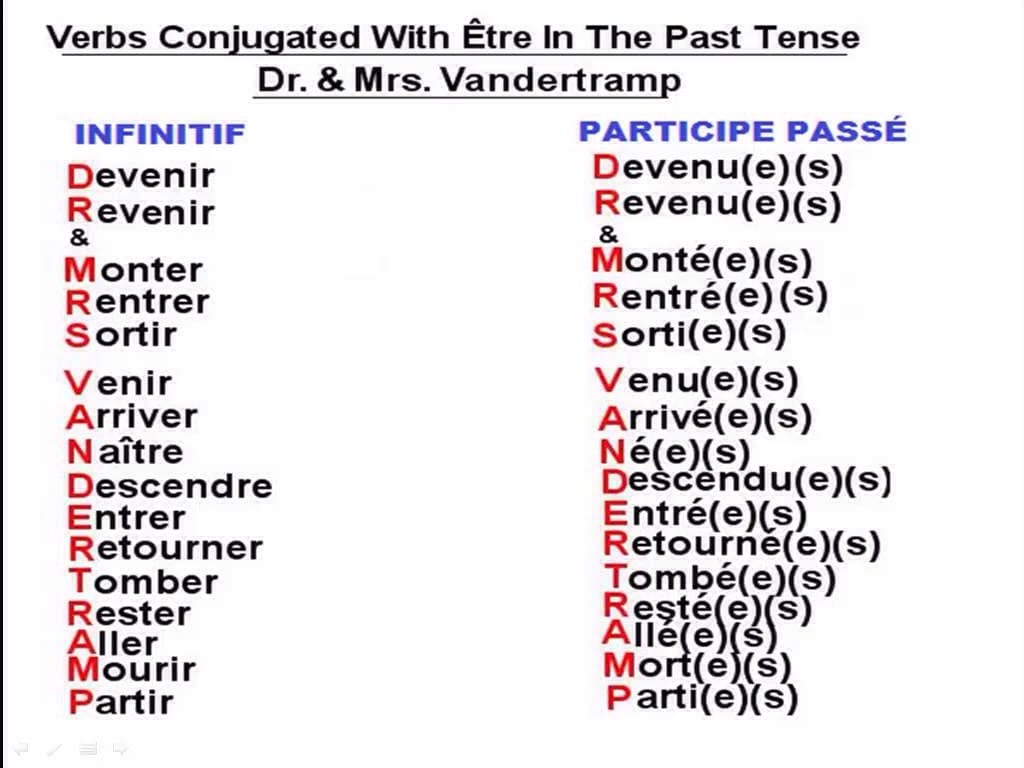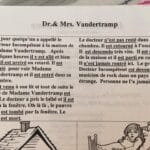Tackling French verbs in the past tense—specifically, the *passé composé*—can be challenging. But a clever trick can simplify things, especially when dealing with verbs that use “être” (to be) instead of “avoir” (to have). Enter “Dr. & Mrs. Vandertramp,” a mnemonic device that helps you remember seventeen “être” verbs. Let’s ditch the confusion and conquer the French past tense.
Decoding the Vandertramp Mnemonic
So, you’re grappling with the French passé composé? Trying to decipher when to use être versus avoir? Let me introduce you to Dr. & Mrs. Vandertramp. They hold the key to those tricky French verbs paired with être.
Inside the House of Être: Unveiling the 17 Verbs
Imagine Dr. & Mrs. Vandertramp residing in their unique “House of Être,” home to seventeen French verbs. These verbs always use être as their companion in the passé composé. They typically describe movement or a change in state of being.
Here are the residents of the House of Être:
| English Verb | French Verb | Passé Composé Example | What Happened? |
|---|---|---|---|
| to become | devenir | Je suis devenu(e) | I became something (or someone) different. |
| to come back | revenir | Je suis revenu(e) | I returned from somewhere. |
| to go up | monter | Je suis monté(e) | I ascended, maybe stairs or a mountain. |
| to stay | rester | Je suis resté(e) | I remained in place. |
| to go out | sortir | Je suis sorti(e) | I exited, perhaps for a night on the town. |
| to leave | partir | Je suis parti(e) | I departed on a journey. |
| to come | venir | Je suis venu(e) | I arrived at a destination. |
| to go | aller | Je suis allé(e) | I went somewhere. |
| to be born | naître | Je suis né(e) | I entered the world. |
| to go down | descendre | Je suis descendu(e) | I descended, like down stairs or a hill. |
| to enter | entrer | Je suis entré(e) | I went inside a building or a room. |
| to return | retourner | Je suis retourné(e) | I went back to a place I’d been before. |
| to fall | tomber | Je suis tombé(e) | I took a tumble. Oops! |
| to return/go home | rentrer | Je suis rentré(e) | I returned to my home. |
| to arrive | arriver | Je suis arrivé(e) | I reached my destination. |
| to die | mourir | Je suis mort(e) | I passed away. |
| to pass | passer | Je suis passé(e) | I went past something or someone, or time elapsed. |
Reflexive Verbs and Être
Many House of Être verbs are reflexive (actions done to oneself). This reflexivity often suggests why a verb takes être.
Passer: The Quirky Exception
Passer can be tricky. While residing in the House of Être, it sometimes uses avoir when meaning “to spend (time).” For example, “J’ai passé une bonne journée” (I had a good day). Context is key! Some linguists suggest this is because “spending time” doesn’t involve the same kind of movement or change of state as other être verbs. Ongoing research may clarify these nuances.
Beyond Vandertramp: The Journey to Fluency
The Vandertramp mnemonic is a helpful starting point, but true fluency involves understanding the deeper grammatical rules. Consider the Vandertramps a stepping stone. Explore the nuances of the passé composé and participle agreement. Remember, language learning is about making the language your own.
Mastering the Vandertramp Verbs: A Comprehensive Guide
Let’s delve into the passé composé and the “17 Mrs. Vandertramp verbs”—a mnemonic to remember which verbs use être. Think of avoir as the usual helper verb, but être sometimes steps in. Mrs. Vandertramp helps us track these instances. These verbs are a major stepping stone toward fluency.
Who are the Vandertramps? They’re a mnemonic family:
- Descendre (to go down)
- Revenir (to come back)
- Monter (to go up)
- Rentrer (to go back in)
- Sortir (to go out)
- Venir (to come)
- Aller (to go)
- Naître (to be born)
- Devenir (to become)
- Entrer (to enter)
- Rester (to stay)
- Tomber (to fall)
- Retourner (to return)
- Arriver (to arrive)
- Mourir (to die)
- Partir (to leave)
- And sometimes… Passer (to pass)
Using the correct helper verb is essential for proper grammar. Mrs. Vandertramp provides a shortcut, but mastering the passé composé involves understanding why these verbs use être. They usually involve a change of state (like devenir) or movement (like aller).
Mrs. Vandertramp is like training wheels. Eventually, you’ll gain confidence and explore French verbs freely. Use the mnemonic to memorize, but delve deeper and discover the logic behind the verbs.
The Vandertramp “Rule”: Demystifying the Mnemonic
Let’s explore the Dr. & Mrs. Vandertramp “rule”—a mnemonic device for French learners. It helps you remember which verbs use être in the passé composé. Think of it as a cheat sheet.
In English, we use “have” as the past tense helper. French uses avoir too, but sometimes être. That’s where the Vandertramps help. Native French speakers likely haven’t heard of this mnemonic—it’s a learner’s tool.
How does it work? Each letter in “Dr. & Mrs. Vandertramp” represents a verb using être in the passé composé.
- Devenir (to become)
- Revenir (to return)
- Monter (to go up)
- Rester (to stay)
- Sortir (to go out)
- Venir (to come)
- Aller (to go)
- Naître (to be born)
- Descendre (to go down)
- Entrer (to enter)
- Retourner (to return)
- Tomber (to fall)
- Rentrer (to return home)
- Arriver (to arrive)
- Mourir (to die)
- Partir (to leave)
- And sometimes… Passer (to pass)
Why these verbs with être? Many describe movement or a change in state of being. But the Vandertramp “rule” isn’t perfect—it’s a guide, not a law. Other verbs use être, and there are exceptions. Passer, for example, sometimes uses avoir.
While the Vandertramps are a valuable starting point, true mastery comes from understanding the grammar rules. The mnemonic is the map, understanding “why” is your compass.
Here’s a table summarizing the verbs:
| Verb | Meaning | Example (Passé Composé) |
|---|---|---|
| Aller | To go | Je suis allé(e) |
| Venir | To come | Je suis venu(e) |
| Arriver | To arrive | Je suis arrivé(e) |
| Partir | To leave | Je suis parti(e) |
| Monter | To go up | Je suis monté(e) |
| Descendre | To go down | Je suis descendu(e) |
| Entrer | To enter | Je suis entré(e) |
| Sortir | To exit | Je suis sorti(e) |
| Naître | To be born | Je suis né(e) |
| Mourir | To die | Je suis mort(e) |
| Rester | To stay | Je suis resté(e) |
| Tomber | To fall | Je suis tombé(e) |
| Retourner | To return | Je suis retourné(e) |
| Rentrer | To return home | Je suis rentré(e) |
| Devenir | To become | Je suis devenu(e) |
| Revenir | To come back | Je suis revenu(e) |
| Passer* | To pass | Je suis passé(e) |
Remember, passer can be tricky! It sometimes uses avoir*.
Language is constantly evolving. Embrace the journey of learning and explore further!
Unlocking the Passé Composé with Dr. Mrs. Vandertramp
Let’s delve into the French passé composé. Dr. Mrs. Vandertramp is our mnemonic for verbs that partner with être, not avoir. She’s a superhero for French learners!
Who is Dr. Mrs. Vandertramp? She’s an acronym:
- Devenir (to become)
- Revenir (to come back)
- Monter (to go up)
- Rester (to stay)
- Sortir (to go out)
- Venir (to come)
- Aller (to go)
- Naître (to be born)
- Descendre (to go down)
- Entrer (to enter)
- Retourner (to return)
- Tomber (to fall)
- Rentrer (to return/go home)
- Arriver (to arrive)
- Mourir (to die)
- Partir (to leave)
- and sometimes Passer (to pass).
Seventeen verbs! Dr. Mrs. Vandertramp will become your best friend, reminding you to use être.
Here’s a table with passé composé examples:
(Table is the same as the one in the “What does Mrs. Dr. Vandertramp help us remember?” section, so it’s omitted here to avoid redundancy)
Many of these verbs involve motion or a change of state. This helps explain why they use être.
Memorizing Dr. Mrs. Vandertramp is a great start, but language learning is a journey. Some linguists suggest these être verbs share a common thread—they often describe a change in the subject’s condition or location. Don’t just memorize; understand the logic.
Don’t be afraid to make mistakes! Embrace the journey and keep practicing. Delve into the captivating history of Carriveau France and uncover the stories woven within its ancient streets. Explore the literary brilliance of Jeanne Wakatsuki Houston and her poignant narratives. You’ll be speaking French with confidence in no time.
- SYBAU See You Baby Meaning: Gen Z Slang Evolves - July 1, 2025
- Unlock Your Inner Youth: Lifestyle Secrets for a Vibrant Life - July 1, 2025
- Decode SYBAU Meaning: Gen Z Slang Explained - July 1, 2025






